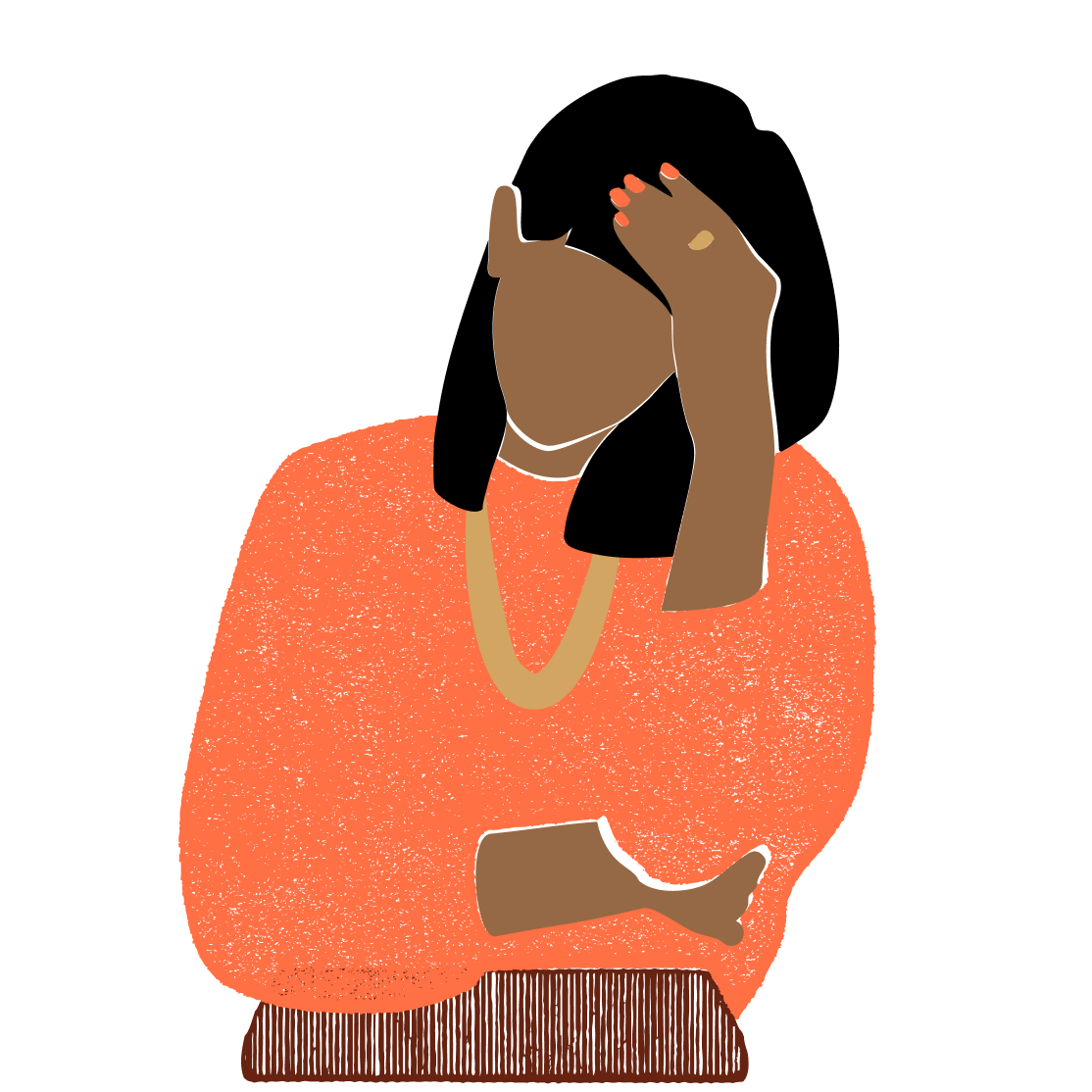Hot flashes and anxiety often go hand-in-hand, and it’s no surprise. Declining estrogen levels can impact your brain’s temperature regulation, which can increase both hot flashes and anxiety. When combined with stress, these physical and emotional changes can be even harder to manage. Fortunately, there are various solutions, including hormonal therapies and lifestyle adjustments, to help ease both hot flashes and anxiety.
Do hot flashes and anxiety go hand-in-hand? Not always, but menopause can definitely make you moody. Consider this: more than 45% of women experience a change in their usual moods during menopause—a decline in estrogen levels can increase baseline anxiety and put you at greater risk for depression. Couple that with the fact that about 75% of menopausal women experience hot flashes, which is also a result of declining estrogen. And because hot flashes can make you more anxious (worried about when the next one will strike), while increased anxiety can contribute to a rise in body temperature, the combination can set you up for a frustrating spin on the hormonal hamster wheel.
But the fact that anxiety and hot flashes are common during menopause doesn’t mean you have to suck it up and power through. At Midi, we know how positive a woman's menopause experience can be when she works with a healthcare provider who takes her symptoms seriously. Midi clinicians are trained menopause specialists who can help you understand the “why” behind physical and emotional changes, and can offer a range of solutions, including prescription medications, supplements, and lifestyle coaching.
“You don’t have to suffer—relief is possible,” says Kathleen Jordan, MD, Chief Medical Officer at Midi Health. “There are a lot of interventions, from hormones to lifestyle hacks, that can help with these symptoms.”
Read on to learn more about the connection between anxiety and hot flashes during menopause and what you can do to find relief for both.
Can Menopausal Hot Flashes Cause Anxiety?
The short answer: Yes, they’re linked but the how behind it all is still unclear. A 2021 study in the journal BMC Women’s Health found that women with more severe nighttime hot flashes also reported more intense anxiety. What they found connected hot flashes and anxiety was poor sleep quality. Night sweats (which are hot flashes that occur at night) can wreak havoc on sleep, and poor sleep, in turn, is highly associated with increased anxiety.
Understanding Hot Flashes During Menopause
Hot flashes are probably the most talked about symptom of menopause. If you know nothing else about this stage, there’s a good chance you’ve been warned about seemingly random temperature spikes and dips.
You’re probably wondering why, though. Why does menopause cause your body temperature to rise unpredictably? The answer is estrogen.
During perimenopause and menopause, your body starts to produce less estrogen and progesterone than it used to. Since you’re no longer ovulating each month, you need a lot less of these hormones. The thing is, estrogen has a hand in regulating many bodily functions, including metabolism, bone density, and, most importantly for hot flashes, aka VMS or vasomotor symptoms. The vasomotor system regulates your body temperature, and when it suddenly has less estrogen than it's been accustomed to for many decades, it can go haywire.
As estrogen levels decline, the hypothalamus (the brain’s thermoregulatory center that controls heat production and loss) becomes sensitive to even the slightest changes in body temperature. Thrown off by hormone fluctuation, the brain thinks the body is too warm and triggers a series of mechanisms meant to bring down the temperature, including expanding blood vessels near the skin’s surface, increasing blood flow and heart rate, and activating sweat glands. So, essentially, a hot flash is your body doing a great job of cooling you off when you’re not actually overheated.
When you experience a hot flash, you may sweat, flush red around your face and chest, and feel warm to the touch. You might also experience a racing heartbeat or dizziness. This can last anywhere from a few seconds to several minutes. If you’ve ever had a panic attack, your hot flashes may feel similar.
In general, women in menopause experience hot flashes for seven to 10 years, though research shows that Black and Latina women experience them for longer. Women of color are also much more prone to hot flashes and other physical symptoms of menopause, though researchers are unclear as to why. And for a small subset of women, hot flashes and night sweats can continue throughout their lives.
Hot flashes can begin at different times for each woman, so you may experience your first one at the onset of perimenopause (some women are surprised it can happen in their 40s) or well after your period has stopped in your 50s.
Every woman’s experience of hot flashes and night sweats is unique. To get personalized recommendations based on your symptoms and health history, you can book a virtual visit with a menopause specialist through a platform like Midi.
The Psychological Impact of Hot Flashes
If those last few paragraphs have you feeling nervous, we get it. The sudden onset and unpredictability of a hot flash is enough to put anyone on edge. They can creep in at inconvenient and embarrassing times—what if you’re in the middle of a presentation at work, at a parent-teacher conference, or on a date?
It’s natural to feel anxious when you don’t feel in control of your body. Not to mention, midlife comes with its own range of stressors. The pressures of work, parenting, and caring for older relatives are hard enough without worrying about your body’s HVAC system malfunctioning. And studies have shown that cortisol levels spike after a hot flash, which can compound any anxiety you were already feeling.
One way that hot flashes can lead to anxiety is by disrupting your sleep. Hot flashes can come and go in the middle of the night, waking you from deep rest and possibly preventing you from getting back to sleep. Not getting enough sleep over a long period of time can make you grumpy, absentminded, and, yes—more anxious than usual.
How Anxiety Influences Menopausal Symptoms
Hot flashes can lead to increased anxiety, but the inverse is also true: Increased levels of anxiety can aggravate other symptoms as well. In fact, a 2016 study in the journal Menopause found that women who experienced somatic anxiety (which is the physical manifestation of anxiety and can show up as a flushed face, racing heartbeat, or stomachache) were at a significantly increased risk for hot flashes compared to those with affective anxiety (which presents as fearfulness or apprehension without the physical signs).
Your physical and emotional health are closely intertwined, so it’s crucial that you take care of both during menopause and beyond. And you don’t have to go it alone. Talk to your doctor or a Midi clinician about how you can better manage your anxiety.
The Cycle of Anxiety and Menopause
You’re prone to anxiety and other mood swings during menopause because fluctuating estrogen levels can disrupt neurotransmitter function in the brain. Estrogen helps stimulate the production of two “feel good” chemicals in the brain—serotonin and dopamine—that play a key role in mood stabilization and concentration.
“As our estrogen levels fluctuate and decline during menopause, our serotonin and dopamine levels decrease as well,” says Dr. Jordan. “This can lead to issues with mood, from feeling full-blown rage to more teary or anxious.”
This can set you up for a vicious cycle: Anxiety triggers the body's stress response, releasing cortisol and other hormones that can further imbalance already-fluctuating estrogen levels.
Anxiety and cortisol can also keep you up at night, preventing you from getting rest regardless of whether or not a hot flash wakes you. Without enough rest, your body can struggle to regulate itself, leaving your defenses down for whatever symptoms roll in that day. It can become a chicken-and-egg situation: You’re no longer sure if your symptoms are leading to heightened anxiety or if your anxiety is leading to worse symptoms. Ultimately, it’s probably a bit of both.
Managing Anxiety During Menopause
Many women experience more intense anxiety for the first time during menopause, which may show up as more frequent crying jags, irritability, blowups, or depression. Don’t brush off how you’re feeling or slog through the emotional highs and lows you’re experiencing. In addition to talking to a menopause specialist, there are simple ways to manage your anxiety that you can try on your own.
Mindfulness meditation, yoga, and regular exercise not only help alleviate anxiety, but they also help regulate the body's response to menopausal changes. Taking a walk in the evening or doing some gentle yoga when you wake in the morning could help you flex your mindfulness muscles and feel better prepared to handle the uncertainties of menopause.
However, anxiety and hot flashes aren’t something you should have to handle on your own. If either of these symptoms—or any other symptoms of menopause—disrupt your daily life or prevent you from enjoying everyday activities, you can book a virtual visit with a menopause specialist through a platform like Midi to get relief.
Coping Methods For Anxiety
If you're experiencing an uptick in anxiety symptoms—for whatever reason— there are ways to handle it
- Breathing
- Meditation
- Guided Imagery
- Other relaxation techniques
Treatment and Management Strategies
Menopause and its symptoms shouldn’t prevent you from living a full and happy life. Since most doctors only receive a few hours of menopause training their entire careers, seek out a menopause expert for the best guidance on how to treat your symptoms.
Medical Treatments for Hot Flashes and Anxiety
Hormone Replacement Therapy (HRT) has long been a go-to solution for managing menopausal symptoms, particularly hot flashes and mood swings. The name is a little misleading—you’re not replacing any hormones but supplementing your estrogen levels. Your doctor will prescribe supplemental estrogen and, for all women with a uterus, progesterone, to help ease the symptoms caused by hormonal fluctuations. HRT takes many forms, including a patch, pill, cream or gel, and should be personalized to your health history and symptoms. By replenishing estrogen and progesterone, HRT can alleviate the severity of hot flashes and reduce the associated anxiety.
“Hard things in life, from issues at work to grief and loss, are going to continue to happen through perimenopause and menopause,” says Midi Clinician Sarah Wallis, MSN WHNP-BC CNM NCMP. “Our goal with HRT is to get you to a good place hormonally, so that you can feel more able to cope with those hard things instead of drowning in them.”
For those who can't or choose not to use HRT, there are non-hormonal medical treatments available as well. An SSRI called paroxetine was recently approved for use at low doses in treating hot flashes and has been shown to be effective in preventing anxiety as well. Veozah has also been FDA approved for hot flashes. Have an open and honest conversation with your healthcare provider about which treatment route will be best for you.
Alternative and Complementary Therapies
At Midi, we champion a holistic approach to healthcare that involves more than just blood tests and prescriptions. Cognitive behavioral therapy (CBT), for example, has been shown to be beneficial for treating both hot flashes and anxiety and depression.
Natural remedies and alternative forms of medicine can also be hugely beneficial to your body and mind during the menopausal transition. Consult with your healthcare provider before trying any of these methods, but don’t be afraid to look outside the examination room for relief.
Multiple herbs, such as black cohosh and evening primrose oil, have been shown to help prevent and manage hot flashes. Black cohosh is a double-duty herb: Studies have linked its use to a noticeable decrease in both physical and emotional symptoms of menopause. Evening primrose oil has been touted for its ability to improve cramps during PMS, reduce hot flashes, and promote better sleep during menopause.

Lifestyle Changes for Better Management
While prescriptions and supplements are potent tools for relief, your lifestyle can also promote a calm mind and healthy body. Managing anxiety in menopause is something you have to practice each day, but don’t stress out about when you’ll find the time. Minor changes can often have a significant impact.
Engaging in regular exercise is a cornerstone of menopausal management. It bolsters physical health, reduces stress, and can help regulate sleep patterns, which are beneficial in managing hot flashes and anxiety. It also helps boost serotonin and dopamine. But you don’t have to sign up for a 45-minute HIIT class to reap the benefits of regular exercise if that’s not your thing—swimming, jogging, and light yoga are all winners. Even just getting outdoors can help, says Dr. Jordan. “A little exposure to green space noticeably lowers our blood pressure and decreases cortisol levels.” Yoga and tai chi are particularly beneficial, as they combine physical movement with mindfulness techniques that directly address anxiety and potentially reduce hot flash frequency.
Getting good sleep may be more challenging now than it used to be, but focusing on good sleep hygiene can help. Establish a sleep routine that signals to your body that it’s time to wind down, and try to perform it as consistently as possible. Make sure your bedroom is a comfy and cozy place as well—use a humidifier if your skin gets dry, play white noise if you need it, or keep a fan on for air circulation through the night. Finally, turn off all your devices at least an hour before bedtime: screen use at night leads to higher insomnia and disturbed sleep rates.
It may sound obvious, but monitor the temperature of your home, and lower the thermostat if necessary! Or, place a fan by your bedside or desk to help cool you down when needed.
Stress Reduction Techniques
Stress management is crucial in mitigating both hot flashes and anxiety. Mindfulness meditation has shown remarkable results in reducing symptom intensity. Practice deep breathing exercises, which can help calm the nervous system and reduce the frequency and severity of hot flashes. Progressive muscle relaxation and guided imagery are additional techniques that can provide immediate relief and long-term stress management.
Dietary Considerations
Nutrition plays a significant role in managing symptoms. Consider the following dietary modifications:
- Reduce caffeine and alcohol intake, which can trigger hot flashes
- Increase intake of plant-based foods rich in phytoestrogens
- Stay hydrated with cool water
- Avoid spicy foods and hot drinks that can trigger hot flashes
The Takeaway
- Hot flashes and anxiety can get into a bit of a vicious cycle—with the hormonal changes of menopause causing variability in your mood and body temperature.
- Recognizing your triggers, and taking steps to either avoid or handle them, can go a long way to improving your symptoms. Some of the changes—to your diet and lifestyle—are small and easy, but have big impacts.
- Talk to your clinician about whether hormone replacement therapy (HRT) may be right for you.
If you’re in perimenopause or menopause and want guidance from clinicians who specialize in women’s midlife health, book a virtual visit with Midi today.
Hormonal change is at the root of dozens of symptoms women experience in the years before and after their period stops.
Our trained menopause specialists can help you connect the dots to guide you towards safe, effective solutions.
Whether you need personalized guidance or a prescription routine to tackle symptoms—including brain fog, hot flashes, sleep trouble, mood swings, and weight gain—we’ve got you covered. Learn more here.
Midi’s mission is to revolutionize healthcare for women at midlife, wherever they live and whatever their health story. We believe that starts with education, to help all of us understand our always-changing bodies and health needs. Our core values guide everything we do, including standards that ensure the quality and trustworthiness of our content and editorial processes. We’re committed to providing information that is up-to-date, accurate, and relies on evidence-based research and peer-reviewed journals. For more details on our editorial process, see here.
 Tabitha Wilson
Tabitha Wilson





